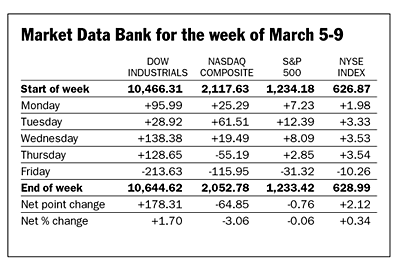|
Associated Press
NEW YORK — For a few hours this past week, Wall Street got a mild reminder of the euphoria that sent stocks roaring last year to some of their highest levels ever.
Goldman Sachs chief investment strategist Abby Joseph Cohen issued a research note Wednesday advising clients to buy and predicting the Dow Jones industrials would hit 13,000 by year’s end.
But the reaction was muted, an illustration of just how much has changed since this time a year ago, when the Nasdaq hit its all-time high of 5,048.62. Although stocks moved up somewhat, a string of earnings warnings and downgrades quickly took back control of the market. By Friday, blue chips and technology stocks had tumbled precipitously.
"I’ve heard of Abby Cohen and I’ve seen her on TV, but I don’t really listen to her much," said Kathleen Greer, a bank customer service representative in Chicago. She worries that some analysts may be promoting the same stocks their firms underwrite or want to do business with. "My investment club uses its own tools to analyze stocks."
The same Wall Street analysts who presided over the Nasdaq’s dramatic ascension are still around, but their influence has waned somewhat as the stocks they covered have fallen sharply.
"The market gets into times of euphoria and depression. Right now, it’s hard for people to get excited," said Kent Womack, a finance professor at the Tuck School of Business at Dartmouth. "I’m sure people are somewhat comforted to hear that she’s positive on the market, but there’s also the reality that earnings don’t look good and probably won’t another quarter from now."
The superstar strategists, including people like Cohen, Merrill Lynch’s Henry Blodget and Morgan Stanley’s Mary Meeker, can still be found on TV and in newspapers. But their influence has lessened as individual and institutional investors, scarred by weak earnings and the shuttering of dot-coms, have moved away from sectors that ignited many of these analysts’ careers.
"It’s definitely quieted down," said Robert B. Walsh, a financial adviser in Jersey City, N.J., who used to regularly field calls from clients interested in stocks they had seen touted on TV. "People still listen to that stuff, but they’ve lost a lot of wealth and don’t have the money to go back in."
Two unexpected earnings warnings from Intel and Yahoo! this past week were a reminder of how fundamentally attitudes and expectations have shifted on Wall Street. Caution, not euphoria, is the rule now.
For the week, the Dow Jones industrial average rose 178.31, a 1.7 percent gain, to 10,644.62, despite tumbling 213.63 Friday.
The Nasdaq composite index fell 64.85, or nearly 3.1 percent, to end the week at 2,052.78, a level not seen since December 1998. It lost 115.95 Friday.
The Standard & Poor’s 500 ended the week off 0.76, a decline of nearly 0.1 percent. It finished at 1,233.42 after losing 31.32 on Friday.
The Russell 2000 index, which tracks the performance of smaller company stocks, fell 3.23, or 0.7 percent, for the week after slipping 7.84 on Friday. It closed at 473.65.
The Wilshire Associates Equity Index ended the week at $11.331 trillion, off nearly $43 billion from the previous week. A year ago the index was nearly $11.374 trillion.
[back to top] |

